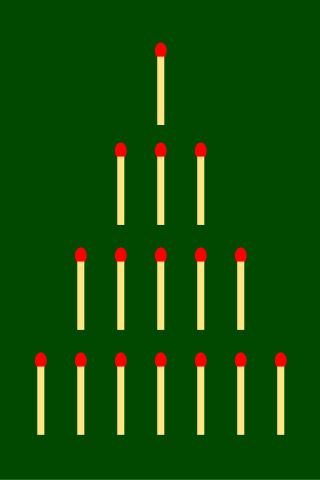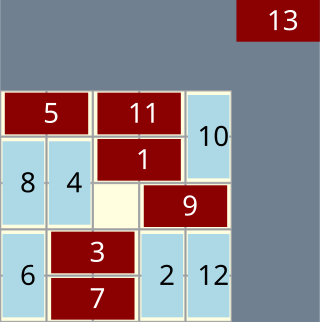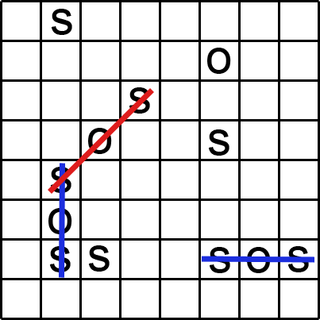Related Research Articles

Dots and boxes is a pencil-and-paper game for two players. It was first published in the 19th century by French mathematician Édouard Lucas, who called it la pipopipette. It has gone by many other names, including dots and dashes, game of dots, dot to dot grid, boxes, and pigs in a pen.

Game theory is the study of mathematical models of strategic interactions. It has applications in many fields of social science, and is used extensively in economics, logic, systems science and computer science. Initially, game theory addressed two-person zero-sum games, in which a participant's gains or losses are exactly balanced by the losses and gains of the other participant. In the 1950s, it was extended to the study of non zero-sum games, and was eventually applied to a wide range of behavioral relations. It is now an umbrella term for the science of rational decision making in humans, animals, and computers.

Nim is a mathematical game of strategy in which two players take turns removing objects from distinct heaps or piles. On each turn, a player must remove at least one object, and may remove any number of objects provided they all come from the same heap or pile. Depending on the version being played, the goal of the game is either to avoid taking the last object or to take the last object.

Richard Channing Garfield is an American mathematician, inventor and game designer. Garfield created Magic: The Gathering, which is considered to be the first collectible card game (CCG). Magic debuted in 1993 and its success spawned many imitations.
In combinatorial game theory, an impartial game is a game in which the allowable moves depend only on the position and not on which of the two players is currently moving, and where the payoffs are symmetric. In other words, the only difference between player 1 and player 2 is that player 1 goes first. The game is played until a terminal position is reached. A terminal position is one from which no moves are possible. Then one of the players is declared the winner and the other the loser. Furthermore, impartial games are played with perfect information and no chance moves, meaning all information about the game and operations for both players are visible to both players.
Misère, misere, bettel, betl, beddl or bettler is a bid in various card games, and the player who bids misère undertakes to win no tricks or as few as possible, usually at no trump, in the round to be played. This does not allow sufficient variety to constitute a game in its own right, but it is the basis of such trick-avoidance games as Hearts, and provides an optional contract for most games involving an auction. The term or category may also be used for some card game of its own with the same aim, like Black Peter.

Combinatorial game theory is a branch of mathematics and theoretical computer science that typically studies sequential games with perfect information. Study has been largely confined to two-player games that have a position that the players take turns changing in defined ways or moves to achieve a defined winning condition. Combinatorial game theory has not traditionally studied games of chance or those that use imperfect or incomplete information, favoring games that offer perfect information in which the state of the game and the set of available moves is always known by both players. However, as mathematical techniques advance, the types of game that can be mathematically analyzed expands, thus the boundaries of the field are ever changing. Scholars will generally define what they mean by a "game" at the beginning of a paper, and these definitions often vary as they are specific to the game being analyzed and are not meant to represent the entire scope of the field.
In combinatorial game theory, the zero game is the game where neither player has any legal options. Therefore, under the normal play convention, the first player automatically loses, and it is a second-player win. The zero game has a Sprague–Grundy value of zero. The combinatorial notation of the zero game is: { | }.

Domineering is a mathematical game that can be played on any collection of squares on a sheet of graph paper. For example, it can be played on a 6×6 square, a rectangle, an entirely irregular polyomino, or a combination of any number of such components. Two players have a collection of dominoes which they place on the grid in turn, covering up squares. One player places tiles vertically, while the other places them horizontally. As in most games in combinatorial game theory, the first player who cannot move loses.

Hackenbush is a two-player game invented by mathematician John Horton Conway. It may be played on any configuration of colored line segments connected to one another by their endpoints and to a "ground" line.

In game theory, a sequential game is a game where one player chooses their action before the others choose theirs. The other players must have information on the first player's choice so that the difference in time has no strategic effect. Sequential games are governed by the time axis and represented in the form of decision trees.
In the mathematics of combinatorial games, the sum or disjunctive sum of two games is a game in which the two games are played in parallel, with each player being allowed to move in just one of the games per turn. The sum game finishes when there are no moves left in either of the two parallel games, at which point the last player to move wins. This operation may be extended to disjunctive sums of any number of games, again by playing the games in parallel and moving in exactly one of the games per turn. It is the fundamental operation that is used in the Sprague–Grundy theorem for impartial games and which led to the field of combinatorial game theory for partisan games.

Several map-coloring games are studied in combinatorial game theory. The general idea is that we are given a map with regions drawn in but with not all the regions colored. Two players, Left and Right, take turns coloring in one uncolored region per turn, subject to various constraints, as in the map-coloring problem. The move constraints and the winning condition are features of the particular game.

SOS is paper and pencil game for two or more players. It is similar to tic-tac-toe and dots and boxes, but has much greater complexity.
Subtract-a-square is a two-player mathematical subtraction game. It is played by two people with a pile of coins between them. The players take turns removing coins from the pile, always removing a non-zero square number of coins. The game is usually played as a normal play game, which means that the player who removes the last coin wins. It is an impartial game, meaning that the set of moves available from any position does not depend on whose turn it is. Solomon W. Golomb credits the invention of this game to Richard A. Epstein.

The game of Go is one of the most popular games in the world. As a result of its elegant and simple rules, the game has long been an inspiration for mathematical research. Shen Kuo, an 11th century Chinese scholar, estimated in his Dream Pool Essays that the number of possible board positions is around 10172. In more recent years, research of the game by John H. Conway led to the development of the surreal numbers and contributed to development of combinatorial game theory (with Go Infinitesimals being a specific example of its use in Go).

Kayles is a simple impartial game in combinatorial game theory, invented by Henry Dudeney in 1908. Given a row of imagined bowling pins, players take turns to knock out either one pin, or two adjacent pins, until all the pins are gone. Using the notation of octal games, Kayles is denoted 0.77.
In combinatorial game theory, and particularly in the theory of impartial games in misère play, an indistinguishability quotient is a commutative monoid that generalizes and localizes the Sprague–Grundy theorem for a specific game's rule set.
In combinatorial game theory, a branch of mathematics, a hot game is one in which each player can improve their position by making the next move.
In combinatorial game theory, a subtraction game is an abstract strategy game whose state can be represented by a natural number or vector of numbers and in which the allowed moves reduce these numbers. Often, the moves of the game allow any number to be reduced by subtracting a value from a specified subtraction set, and different subtraction games vary in their subtraction sets. These games also vary in whether the last player to move wins or loses. Another winning convention that has also been used is that a player who moves to a position with all numbers zero wins, but that any other position with no moves possible is a draw.